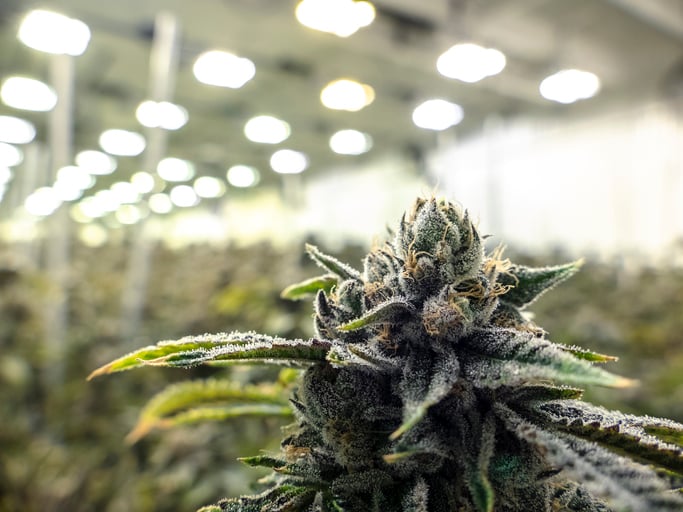The marijuana industry is budding before Wall Street's and investor's eyes, and it's no surprise that North America is in full focus.
To our north, Canada is preparing for marijuana legalization 2.0. Having already legalized and launched recreational cannabis sales on Oct. 17, 2018, Health Canada plans to begin enforcing derivative pot product regulations on Oct. 17, 2019, with actual product, such as edibles, concentrates, beverages, vapes, and topicals, set to hit dispensary shelves by mid-December. This is an especially exciting moment for the Canadian pot industry given that derivatives offer much better margins than dried cannabis flower.
In the U.S., investors are focused on the possible expansion of legal cannabis -- recreational or medical –- at the state level. Since 2012, 11 states have given the green light to adult-use consumption, and the 2020 election year should lead to even more states jumping onboard the recreational legalization movement.

Image source: Getty Images.
But over the long-term, the international markets could have a lot of offer the cannabis industry. Let's remember that while only two countries have OK'd recreational weed (Canada and Uruguay), more than 40 worldwide allow the use of medical marijuana in certain instances. That makes these more than three dozen countries potential customers of Canadian growers.
Right now, there are three Canadian cannabis stocks leading the charge on the international front, all of which have exposure to at least one dozen countries outside of their home market.
Aurora Cannabis: 25 countries (including Canada)
Hands-down, there's no marijuana stock that can hold a candle to the aggressive international expansion that Aurora Cannabis (ACB 3.20%) brings to the table. Aurora has production, export agreements, or research ongoing in 25 countries worldwide, including Canada.
These foreign markets hold a two distinct purposes for Aurora. First, medical marijuana patients tend to use and purchase marijuana more often than recreational users, and, more important, they're also more willing to buy high-margin derivative products. That makes medical marijuana patients just the sort of high-margin consumers that cannabis stocks would love to have as repeat customers.
Secondly, the international markets also provide Aurora with an external channel to ship excess Canadian production. According to various reports, demand in Canada might be met with 800,000 kilos to 1 million kilos of supply per year. Yet, peak production might push well beyond 3 million kilos, if not closer to 4 million kilos, per year. That means growers need to have options available to export this excess production – and Aurora certainly has those external channels available.

Image source: Getty Images.
Canopy Growth: 16 countries (including Canada)
The largest marijuana stock in the world, Canopy Growth (CGC +0.00%), is another company that's been aggressively pushing into external markets. Including Canada, Canopy has a presence in 16 countries, none of which bears more importance than the United States.
The most optimistic estimates suggest that the U.S. cannabis market could reach $100 billion in annual sales in a decade. Of course, for that to happen we'd need the federal government to change its tune. In the meantime, Canopy Growth has acquired intellectual property company ebbu in Colorado, was awarded a hemp-processing license in New York State, and agreed to buy Acreage Holdings on a contingent-rights basis in a $3.4 billion cash-and-stock deal, when announced. This last deal is contingent on the U.S. federal government legalizing marijuana.
Then again, Canopy Growth is interested in more than just the U.S. market. The company's medical and research brand, Spectrum Therapeutics, is operating in more than a dozen countries, with plenty of potential for growth throughout Europe and South America.

Image source: Getty Images.
Tilray: 13 countries (including Canada)
Even though it's been a complete dud for investors of late, Tilray (TLRY +0.00%) has done a good job of positioning itself for overseas success. Including Canada, Tilray supplies cannabis, or conducts research, in 13 countries worldwide.
Like Canopy Growth, Tilray projects to lean on the U.S. market as a major source of ex-Canadian revenue. Having acquired hemp foods company Manitoba Harvest in March, Tilray can lean on Manitoba's North American distribution network of more than 16,000 retail doors to distribute cannabidiol (CBD)-containing products in the years to come. In the U.S., CBD sales are expected to grow at a compound annual rate of more than 100% through 2023, according to the Brightfield Group.
Currently, Tilray has pharmaceutical export distribution agreements in place with a dozen countries, including Australia, Germany, and South Africa, and has a number of research studies under way, including in the United Kingdom and United States. It also has a licensed grow farm in Portugal that'll be perfectly set up to supply European medical marijuana patients in select countries.

Image source: Getty Images.
The most important thing to remember about international expansion
Although no marijuana companies have a larger overseas presence than Aurora Cannabis, Canopy Growth, and Tilray, it's important to realize success in overseas markets isn't going to happen overnight.
Just take a gander at the latest international sales figures for all three companies for confirmation of this. Aurora, Canopy, and Tilray, respectively recorded (in Canadian dollars), CA$4 million, CA$10.5 million, and CA$1.9 million in international sales in their most recent quarters, which is virtually nothing compared to the longer-term potential of medical marijuana in overseas markets.
The fact is that overseas markets aren't going to be able to thrive until Canadian demand is satiated, and it's unclear at this point when that'll happen. Canada has been contending with persistent supply issues since it launched recreational weed more than 10 months ago, and while many of the problems associated with this supply shortage are being dealt with, these fixes won't happen overnight. Once Canadian demand is dealt with, then, and only then, can international markets be given a chance to shine.
In other words, investors in Aurora Cannabis, Canopy Growth, and Tilray are going to need to exercise patience before their internationally focused strategies begin to bear fruit.







